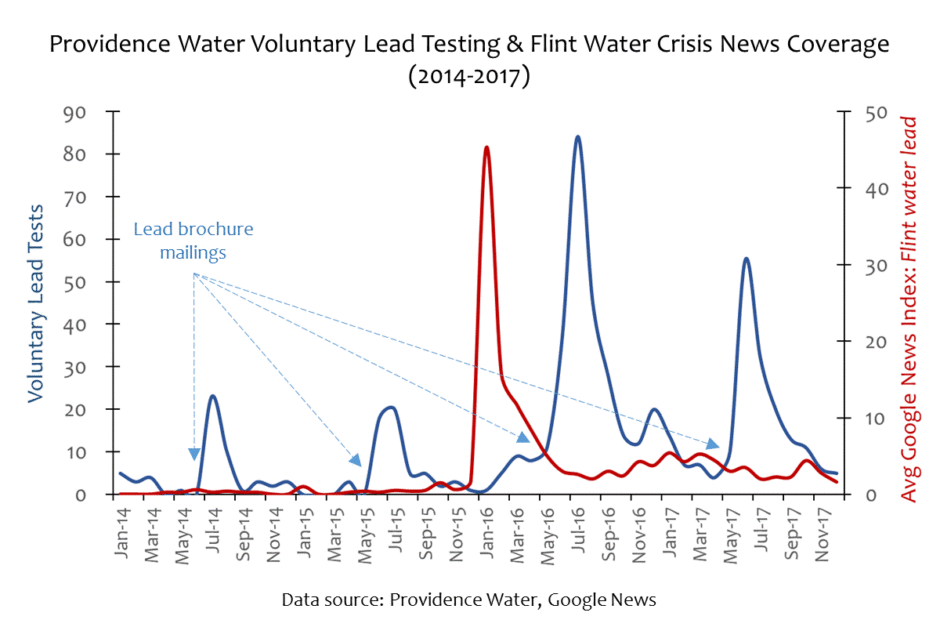hyperopia (hīˌpə-rōˈpē-ə). n. A condition in which visual images come to a focus behind the retina of the eye and vision is better for distant than for near objects
Last week I had the pleasure of speaking at the Connecticut AWWA’s annual conference. There I shared a the stage with a team from Providence Water, who told the story of their city’s struggles with lead contamination in drinking water. One of the most surprising things about Providence’s experience is the way that its customers apparently responded to the Flint water crisis.
Lead in Providence
Lead contamination in drinking water is a long-standing problem in Providence. Like many older American cities, Providence has many buildings with lead plumbing. As in Flint, Providence’s water system requires careful corrosion control in its treatment process to limit the release of lead into the drinking water supply. Lead contamination has been detected consistently in Providence’s water system since testing began in 1992—usually hovering just below EPA’s action level of 15 ppb—but it spiked to 30 ppb in 2009 and again in 2013, prompting increased regulatory scrutiny.* According to last week’s presentation, at least one Providence test site yielded lead contamination greater than 200 ppb—far higher than the levels that sparked outrage in Flint. Unlike Flint, where leaders denied and obfuscated lead contamination, Providence has publicly acknowledged and taken steps to address the issue: they’ve changed maintenance protocols and treatment methods, and introduced programs to replace lead service lines in its system.
As part of that effort, in 2014 Providence Water began offering drinking water lead testing for $10 to any customer who wanted it (earlier this year they started offering testing for free). In providing this service the utility also gathers valuable data on its own system. Initial participation in this voluntary testing regime was moderate, with an average of 4.7 customers requesting testing each month over the first two years of the program.
Hydro hyperopia
Then something unexpected happened in 2016: Participation in Providence’s lead testing program skyrocketed—after the Flint Water Crisis grabbed national headlines. Water contamination in Flint made Americans everywhere reconsider what comes out of their own taps. The figure below plots monthly voluntary lead testing in Providence from 2014-2017 (blue line); the utility mails its testing brochure in the May/June billing cycle, and so testing jumps in June and July each year.** The graph also shows monthly average Google News Index for coverage of the lead crisis in Flint (red line). Providence Water’s own lead contamination issues emerged in 2009, but when Flint put drinking water into the national spotlight in 2016, Providence citizens took action locally.
Are the people of Providence responding to events in Flint? It’s impossible to be certain, but the circumstantial evidence is strongly suggestive. A lead crisis 700 miles away apparently caused a 400% increase in lead testing participation by focusing Rhode Islanders’ attention on the contamination that they’d been living with for decades.
Focusing event
The water crisis in Flint is the Cuyahoga River fire of our generation: an event that thrust a widespread but underappreciated problem into the national consciousness. Political scientists call these focusing events: harmful, high-profile occurrences that suddenly put previously obscure issues onto the public policy agenda. One important consequence of the newfound attention to drinking water quality is that citizens everywhere think differently about their own utilities and drinking water. They may not deserve it, but utilities everywhere must now grapple with the Flint Water Crisis’ awful legacy. The effects of the Flint Water Crisis on the people of Providence, Rhode Island show such events afar can transform citizens’ interactions with their own local governments.
*No level of lead is healthy according to the CDC, especially for young children.
**Thanks to Providence Water for providing these data.


